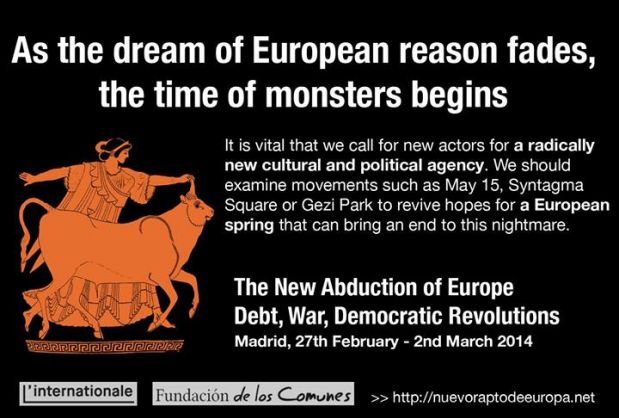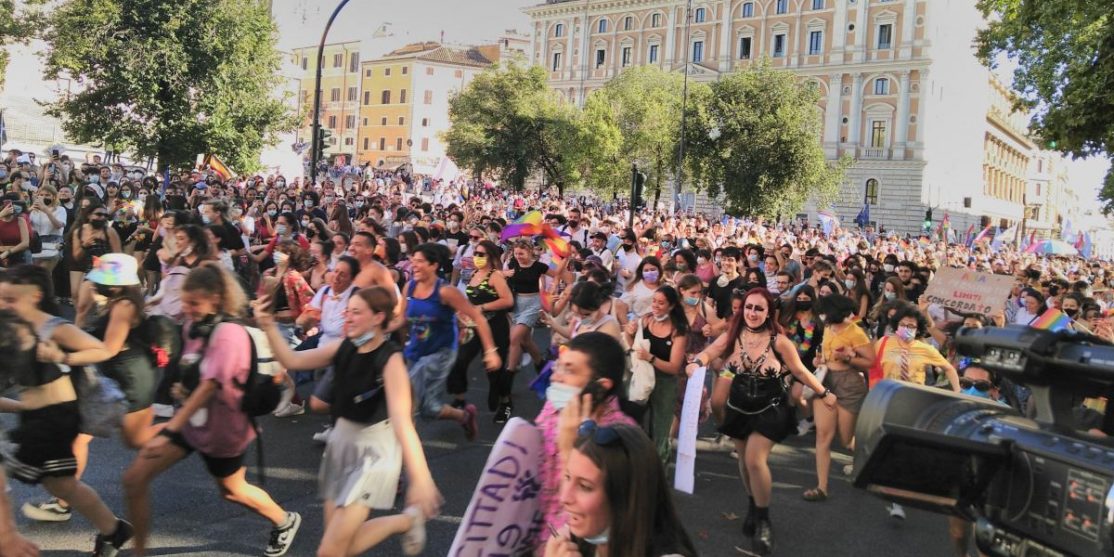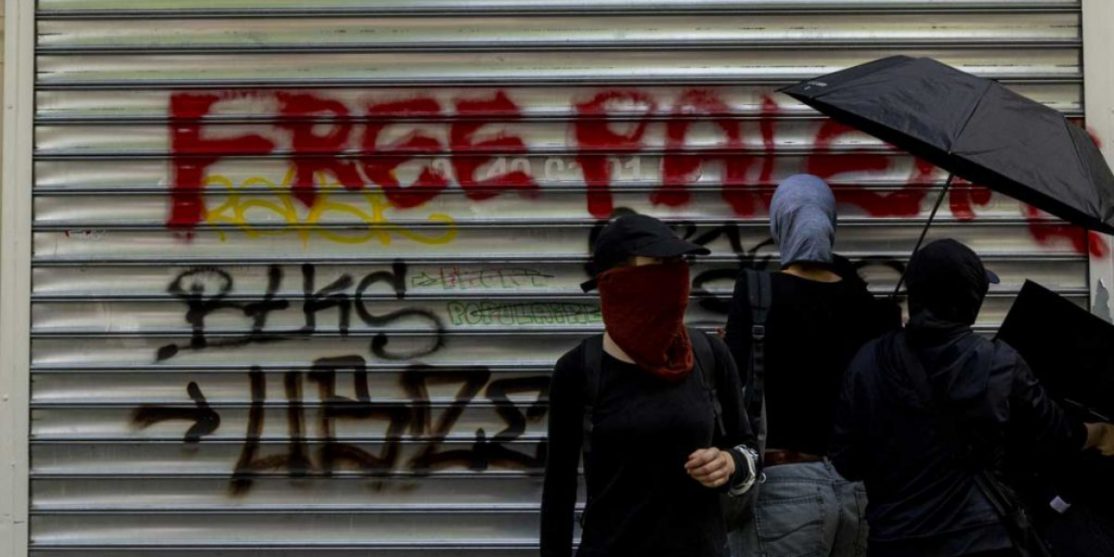EUROPA
The new abduction of Europe

Tre giorni di dibattito sull’Europa a Madrid. Qui in inglese la presentazione e il programma de “Il nuovo ratto d’Europa”: debito, guerra e rivoluzioni democratiche. Organizzato da L’internationale, European network of museums, and Fundación de los Comunes, il meeting si terrà dal 27 febbraio al 1 marzo […] e ospiterà tre tavole rotonde e diversi workshop articolati attorno alle questioni delle migrazioni, austerità, rivolte, politica culturale, welfare del comune e tecnopolitica nello spazio euromediterraneo
More info: nuevoraptodeeruopa.net //Call for ideas // Program // Manifesto
The project of a united Europe, as conceived after the Second World War, is largely exhausted. Little credibility remains in the fictions of that “cunning of European reason” that believed it could overcome the causes of the continent’s historical tragedy (war, dictatorship and fascism, exploitation and inequality, colonialism and racism) by emphasising the virtues of “social market economy” and the old geopolitical combination of the States, rather than through a decisive constituent proposal. The causes of this situation are varied and enormously complex, but from the historical point of view, it is possible to identify certain landmark events in this long agony. On the one hand, the fall of the Berlin Wall and the end of the Cold War, which reduced the need for a united Europe that was equally anti-Soviet and antifascist, and on the other, the shift towards neoliberal ideas in the EU process during the 90s and the failure of the European Constitution process, which contributed to a generalised feeling of indifference among the citizenry and disenchantment with the European project. This explains the establishment, under the pretext of the global debt crisis, of what Étienne Balibar has called the “commissarial dictatorship” of the Troika.
There is a new “abduction of Europe”, but not through the cleverness of Zeus who, charmed by the Phoenician woman named Europa, abducts her so he can show her the pleasure and glory of the Greek kingdom. This time, it is financial logic that has abducted her, and in return has set an unpayable price: democracy, social rights, the emancipation of the victims of colonialism, equality and brotherhood on the continent. But as the dream of European reason fades, the time of monsters is begins. Whether beloved or condemned, the European Union is an allusion, albeit in an imperfect and contradictory one, to the emancipatory traditions of this continent since the Enlightenment: a Europe united by the ideas of social and political emancipation, a Europe that goes beyond the national borders of the post-colonial States and their traditions of war and periodic destruction.
The attempted return to the “sovereignty” of nation-states in the current financial and institutional catastrophe creates a kind of mirage that makes it easy to forget that in Europe, sovereignty, nationalism and war have always been inseparable
.
The event The New Abduction of Europe. Debt, War, Democratic Revolutions hopes to lay the foundations for a radically new European cultural and political agency, driven by the urgency of the situation. It seems futile to call for a Eurocentric humanist consciousness if such consciousness is incapable of reflecting the non-Europe within Europe, the results and challenges of its colonial, imperialistic and fascist past, of the modifications taking place in the world system and of the end of liberal public spheres and the emergence of the network of networks. It is vital that we call for new actors.
It has likely been both the world of cultural and artistic production and the new movements of cognitive and creative work, squeezed between increasing instability and individualisation, and also the social movement of migrations (which has confronted us with the post-colonial skeleton in Europe’s closet), which have practiced and theorized Europe as the smallest possible expression of consistency in the political realm over the last two decades. Perhaps we should examine the Arab springs, or movements such as Spain’s ‘May 15th’ protests, Syntagma Square in Greece, or the events at Istanbul’s Taksim Gezi Park, to revive hopes for a European spring that can bring an end to the current nightmare. It is impossible to think about a European future without first examining, interpreting and disseminating these experiences, which are not a thing of the past but are fully alive and absolutely of the present.

PUBLIC DEBATES
The event will include four round-tables and a debate on the evenings of February 27th – 28th and March 1st. The debates will be open to the public and streamed live. A dialogue will be established with members of the whole audience, whether physically present or participating through social networks.
Thursday 27th February
19:00 – 20:00 Opening dialogue Antonio Negri, Zdenka Badovinac, Manuel Borja-Villel and Raúl Sánchez Cedillo
The austerity policies put in place by European governments through the Troika have turned a financial crisis into a project bent on the destruction of social and workers’ rights, and they have established a regime of infinite debt on individuals and institutions. But new political and institutional creations are demonstrating that debt and democracy based on citizen participation and on social rights are incompatible. In these creations we get a glimpse of prototypes of a Europe made from the bottom up, out of the sense of brotherhood of the social struggles and self-organisation by citizens.
Friday 28th February
18:30 -19:30 Roundtable 1: Organization in a Time of Crisis
Discussion between Antonio Negri, Valery Alzaga and Ada Colau. Moderator: Raúl Sánchez Cedillo.
The austerity policies put in place by European governments through the Troika have turned a financial crisis into a project bent on the destruction of social and workers’ rights, and they have established a regime of infinite debt on individuals and institutions. But new political and institutional creations are demonstrating that debt and democracy based on citizen participation and on social rights are incompatible. In these creations we get a glimpse of prototypes of a Europe made from the bottom up, out of the sense of brotherhood of the social struggles and self-organisation by citizens.
19:30 – 20:30 Roundtable 2: New Democracies and Paths towards the Commons
Discussion between Isabell Lorey, Montserrat Galcerán and Marina Garcés. Moderator: Someone from FdlC (tbc).
The ideal of social and political citizenship in Europe has never been more than a distant aspiration, constantly belied by the facts. While in effect, it was dominated by a white, male, industrial, national and state-oriented figure. And with the hegemony of the neoliberal paradigm, even the collective reference associated with the working class and union movements has disappeared. The “government of the precarious” is imbued with individualism and the abandonment of collective solidarities. However, the practices of the commons, both those linked to the “natural commons” (water, land, renewable energies) and those linked to the “artificial commons” (knowledge, care-giving, networks) enable us to imagine a Europe united by new institutions of the commons, born out of cooperation and care-giving between precarious lives that have taken the form of a challenge.
Saturday 1st March
18:30 -19:30 Roundtable 3: Europe as a Province
Discussion between Ranabir Samaddar, Sandro Mezzadra and Jesús Carrillo. Moderator: Francesco Salvini.
The ambiguity of the European project can be seen in its very history. The antifascist brotherhood of the “founding fathers” never questioned the colonial and imperialist reality of the founding nations. The return of the repressed lives in the peripheries of European cities, as the post-colonial reality; banlieue, internal borders and the political exclusion of millions of people. At the same time, the convulsions of the globalisation process all over the world put the continent in a provincial position, i.e. no longer central. The end of the colonial legacy of the European nations is considered a condition for democratic emancipation on the continent.
19:30 – 20:30 Roundtable 4: Towards a New Social Contract for Culture
Discussion between Carmen Mörsch, Hilary Wainwright and Bojana Piskur. Moderator: Yaiza Hernández.
Culture, which was one of the pillars of the ideological reconstruction of Europe after the war, has seen its enlightened foundations slowly erode as a result of its enclosure in the market and in art institutions, and because of its distance from society’s conflicts and contemporary subjectification processes. What would be the basic elements of this new contract that would put culture at the centre of social emancipation processes?
more info about participants, events and methodology http://nuevoraptodeeuropa.net/
Web site Fundacion de los Comunes




